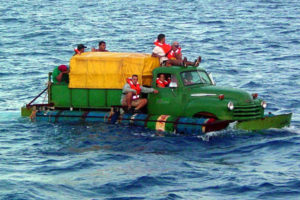US reverses Cuban emigree policy
The US has suddenly ended the long standing arrangement that meant migrants fleeing Cuba who were able to reach America were automatically allowed to stay.
In one of his last actions as President Barak Obama said this week that “Cuban nationals who attempt to enter the United States illegally . . . will be subject to removal,” treating them “the same way we treat migrants from other countries”.
 For decades the US has welcomed refugees fleeing the communist dictatorship under the so called ‘wetfoot, dryfoot’ policy which allowed those reaching landfall in the US to stay while sending back to Cuban or to third countries those intercepted at sea.
For decades the US has welcomed refugees fleeing the communist dictatorship under the so called ‘wetfoot, dryfoot’ policy which allowed those reaching landfall in the US to stay while sending back to Cuban or to third countries those intercepted at sea.
Commentators are divided over the fall out of the move. Some say it sends a frightening message to persecuted people wanting to leave their countries. Others say it is an important step forward in the normalisation of relations between the United States and Cuba.
Yet another view is that it is an act of challenging incoming president Donald Trump who will now find himself in the difficult position of having to decide whether to accept such a normalisation of relations with long-hated Cuba as well as reconsider his promise to close the borders and turn away all migrants.
Mr Trump has indicated his unhappiness with increased ties with Cuba while threatening to reverse normalisation.
“If Cuba is unwilling to make a better deal for the Cuban people, the Cuban/American people and the US as a whole, I will terminate deal,” he tweeted in November.
More than a million Cubans have come to US since the island’s 1959 revolution.
More than 250,000 have been granted residency under the Obama administration under the law, which can only be repealed by Congress.
The new policy was agreed with the Cuban government, which issued a statement calling it “an important step in the advance of bilateral relations” that will guarantee “regular, safe and orderly migration.”
The Cuban government had long complained about the special status for Cubans which it said encouraged illegal travel in unseaworthy vessels, homemade rafts and inner tubes
As part of the deal Cuba will also allow any citizen who has been out of the country for up to four years to return.
Previously, anyone who had been gone for more than two years was legally said to have “emigrated.” The Cuban government has said it will continue to “modernize” its immigration policies.
The White House described the changes as a logical extension of the normalization of relations with Cuba that began in December 2014, when Obama and Cuban President Raúl Castro announced they would end more than a half-century of estrangement.
Since then, US-Cuba diplomatic relations have been ¬reestablished, and President Obama has used his regulatory powers to ease long-standing restrictions on commerce and trade as well as travel by US citizens to the island under the continuing US embargo.
Laurie Nowell
AMES Australia Senior Journalist












